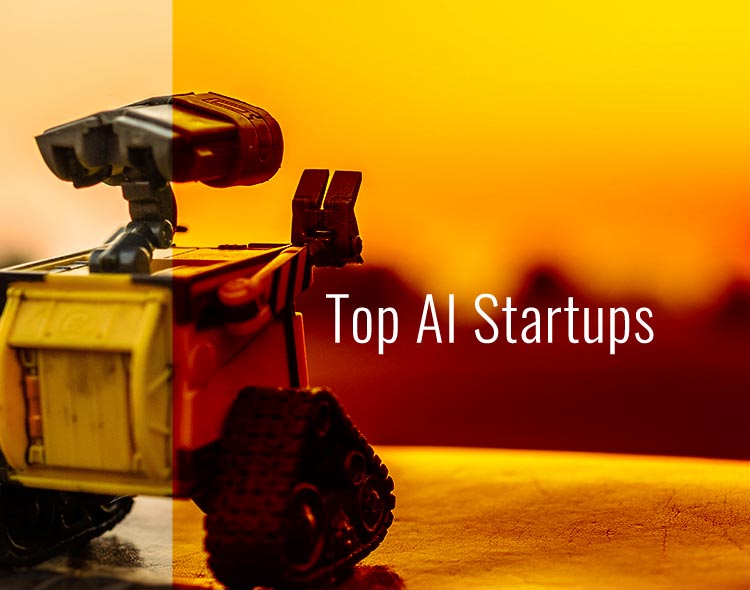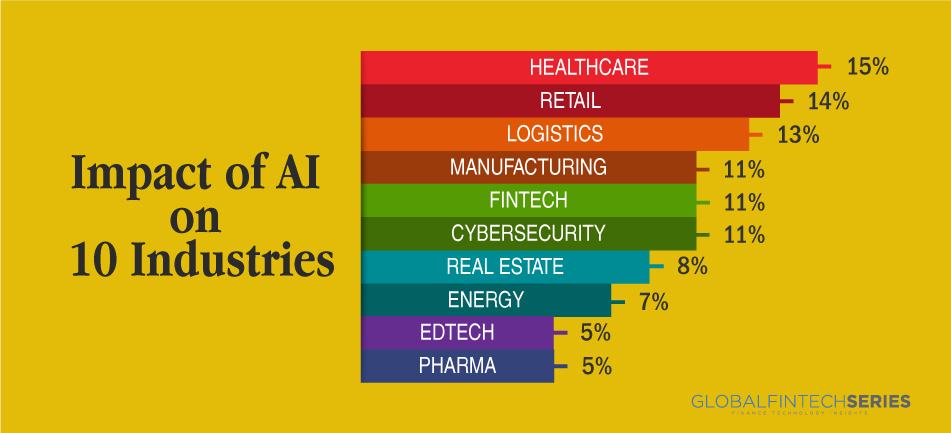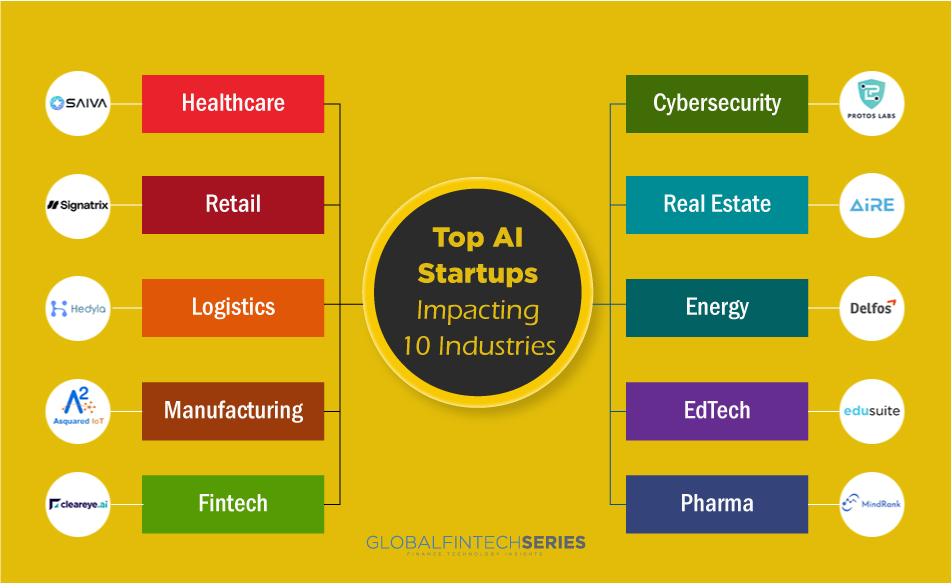Through the application of pattern recognition, artificial intelligence (AI) enhances industrial operations and automates back-office duties. Businesses can do this to save time and use resources more effectively. For this reason, businesses incorporate artificial intelligence (AI) and AI-based data processing techniques like machine learning and natural language processing (NLP) into their workflows.
Top 10 Industries Impacted by AI Startups
You can see a list of the 10 developing AI firms and the 10 industries they are targeting in the Innovation Map down below. This study gives you an overview of new technologies & startups improving AI, supplying you with data-driven innovation insight that enhances strategic decision-making.The healthcare, retail, logistics, and energy sectors are all significantly impacted by AI since it facilitates data-driven decision-making. In order to uncover patterns and trends and improve operations, it gathers and analyses data from sensors, electronic records, and other data management systems. Similar to this, the manufacturing, Finance, and cybersecurity sectors use predictive analytics powered by AI to foresee danger. On the other hand, businesses in the real estate and retail industries improve consumer engagement and experiences using AI-powered solutions. The pharma industry uses AI to speed up drug research and optimize pharma manufacturing, while the EdTech sector uses it to better school management.
Latest Read: Modern Management Tools You Can’t Miss
AI’s Effects on 10 Industries
1. Health Care
AI is used in the healthcare industry to enhance clinical judgment and patient access. For instance, a lot of firms provide machine learning-based systems to review medical images and provide guidance for diagnosing diseases. AI also improves the utilization of electronic health record (EHR) data for trend identification and individualized healthcare. This enables medical facilities and practitioners to guarantee prompt treatments and lower patient dangers. Hospitals also utilize intelligent process automation (IPA) based on AI to automate manual processes like as transcription and arranging patient visits. Medical gadgets with AI capabilities also improve the efficiency of telehealth services and remote patient monitoring, providing quick medical care. A US-based firm called SAIVA makes patient triaging and monitoring easier. The startup’s approach collects and examines patient information using machine learning and EHR data. Vital signs, lab results, diagnoses, and progress notes are some of them. Additionally, it examines adjustments made during several nursing shifts to connect patient-specific data points. This lowers the number of readmissions by allowing doctors and nurses to recognize risk factors and arrange clinical interventions.
2. Retail
Retail businesses use AI largely to improve the consumer experience through personalized product recommendations and facilitated in-store experiences. By predictive inventory planning and stock allocation, technology also enhances retail operations. Retailers can reduce expenses and boost revenues by using these technologies to streamline backend operations and guarantee customer happiness. They are additionally able to recognize industry trends, enhance product pricing, and look for chances to increase sales thanks to AI-driven consumer analytics. Last but not least, AI-driven in-store analytics provide shelf intelligence that enables merchants to improve stock visibility and find underperforming products.
German firm Signatrix offers in-store visual intelligence. The hardware and software solutions from the firm, which make use of AI, interact with current CCTV systems to examine store activity. It provides aggregated statistics to find reoccurring tendencies and confirm the effectiveness of promotions. Additionally, merchants can use Signatrix’s products to identify in-store incidents to help staff and store management. They can then reduce inefficiencies and enhance the client experience as a result.
3. Logistics
Lack of supply chain and operational transparency is a significant barrier for the logistics sector. In order to discover and provide transparency to operations, AI makes use of data from sensors and data management systems across the logistics value chain. For instance, several startups provide workflow optimization tools that quickly spot pick-and-place machine delays and malfunctions that impact delivery timelines. These technologies give logistics organizations the ability to reduce inventory management errors, prevent package abuse, and increase warehouse productivity. As a result, AI in logistics ensures timely package delivery and increases profits. As a result, AI in logistics ensures timely package delivery and increases profits. Software for logistics route optimization is available from the Spanish startup Hedyla. Operators can utilize the startup’s application programming interface (API) to integrate order data or import orders using spreadsheets. The platform then uses AI to find bottlenecks, send routes to drivers, and optimize route planning based on daily orders. This enables logistics companies to scale back their fleets, increase delivery volume, cut expenses, and lower carbon emissions.
Read Latest : Struggling To Manage Your Money? Here’s The Solution With Budgeting Tools
4. Production
Manufacturers must use AI to integrate the Internet of Things (IoT) and big data into manufacturing floors. Instead, these technologies’ created digital touchpoints go unused. Industrial automation, process monitoring, and production optimization in the manufacturing industry are made possible by AI-driven technologies. It enables them to employ advanced analytics to drive predictive maintenance and better visibility into operations. As a result, manufacturing businesses increase production effectiveness, cut waste, lower labor costs, and save on operating expenses. An Indian business called Asquared creates Equilips 4.0, a tool for monitoring manufacturing equipment. To recognize sounds and determine performance and productivity characteristics, it blends machine learning, edge computing, and real-time sound analytics. Next, for manufacturing operations, Equilips 4.0 provides operational statistics and real-time quality measurement. For these insights and to spot anomalies and errors, floor operators use the startup’s accompanying mobile or web app.
5. FinTech
AI advances the financial services sector in all areas, from customer onboarding and verification to guaranteeing compliance and fraud prevention. To examine a variety of financial data, banks and non-banking financial institutions (NBFIs) use machine learning and deep learning. The industry is becoming more open to AI-based workflows as open financial systems are adopted more widely. FinTech businesses automate their backend procedures as a result, including customer onboarding and transaction monitoring. In turn, this lessens human mistakes in profile assessment and verification, decreasing the likelihood of fraud. AI is also used in wealth management, fraud detection, credit risk assessment, and customer service.
advancing anti-money laundering technology (AML). A US-based business called Cleareye.ai produces the Topaz AML platform for fraud monitoring and detection. To evaluate enormous pools of financial data, it employs network modeling, statistical techniques, and machine learning. As a result, banks can keep an eye on, become involved, look into, and report on shady transactions. Topaz AML also helps banks avoid unnecessary, time- and money-consuming investigations and lowers false positives in transaction.
6. Cybersecurity
AI significantly contributes to improving cybersecurity across businesses. Businesses have the ability to examine all of their network’s digital touchpoints thanks to AI-based cybersecurity solutions. This makes it possible to move away from cybersecurity tactics that are event-based to ones that are predictive. Additionally, AI automates data access and security management throughout the whole corporate infrastructure with more dynamic data compliance regulations. This enables businesses to reduce costly legal actions brought about by data theft or sensitive data leaks. AI in cyberspace also enhances the management of vulnerabilities, response times, and device monitoring, as well as the discovery of unknown threats. Nexus is a tool for gathering cloud-based cyber risk analytics created by Singaporean firm Protos Labs. It makes use of statistical models, artificial intelligence, and a unique thread-based method based on MITRE’s threat-informed defense strategy. Nexus analyses real-world threats, exploits, and vulnerabilities using these technologies, correlating threats with dark web chatter and asset data. This makes it possible for businesses and insurers to evaluate the performance of cyber controls and quantify risk exposure, thereby maximizing cyber investment.
7. Real Estate
Lead conversion for real estate transactions is significantly impacted by AI-powered virtual assistants. They pique the curiosity of potential customers and more accurately spot business prospects. Because of this, it is utilized by numerous real estate and property management firms. They also use AI to customize services and compile data on properties to evaluate profitability. Several firms use AI to optimize marketing and boost customer engagement, which boosts sales. Additionally, the system forecasts assessments and market value utilizing data from both public and private sources, boosting earnings for real estate companies. Australian firm AiRE creates RiTA, a platform for real estate lead generation powered by AI. It incorporates into systems for customer relationship management (CRM) to assess data on properties, markets, and fresh leads. Additionally, RiTA facilitates customized two-way dialogues with clients and potential leads. This makes it possible for real estate companies to automate lead generation and enable intelligent prospecting.
8. Energy
The energy sector is being forced to rely on cutting-edge data processing tools to help load and demand-side management as a result of the transition to a smart, clean grid. As a result, investments in improving AI integration are seen in the energy-generating and distribution businesses. This allows energy businesses to examine historical trends of energy consumption and predict future needs. Additionally, integrating AI into an IoT-based infrastructure enhances the visibility of energy assets and makes predictive maintenance possible. By doing this, energy firms can prevent unanticipated outages, maintenance fees, and downtime.
Delfos assists in Monitoring of Renewable Energy Assets
A Brazilian business called Delfos produces the Delfos I.M platform for monitoring renewable energy assets. To produce significant insights into asset operations, it blends operational data from sensors, legacy systems, and OPC data access with machine learning models. The platform determines the best prediction model to foretell failures based on asset data. Companies that use renewable energy can reduce unplanned outages, improve maintenance windows, and expand operational expertise thanks to this.
9. EdTech
The widespread use of remote learning has increased the burden for educators in general. AI in the education sector automates a number of processes, including curriculum management, activity monitoring, and attendance tracking. This lessens the administrative work the teachers must do and enables them to manage the classroom and the students more effectively. AI is also used in schools and colleges to tailor the curriculum for pupils and boost engagement. It thus enhances their cognitive capacity. Also, chatbots powered by AI that answer student questions and intelligent examiners who stop cheating during online tests. A campus management system is offered by the Filipino startup Edusuite to schools, colleges, and institutions. To automate and improve numerous administrative duties, it gathers student and administrative data using AI. They comprise, among other things, the analysis of student data, the preparation of class schedules, and the management of the curriculum. Instructors and school administrators can thus avoid time-consuming administrative activities and improve campus administration as a result of this.
10. Pharma
While pharma manufacturing uses AI to improve production processes, drug development is the main application of AI in pharma. AI speeds up drug discovery by facilitating novel hit discovery, hit-to-lead conversion, and lead optimization. For instance, several startups generate cell-based illness models by fusing clinical, genomic, and phenotypic data into predictive models. These tools help pharmaceutical companies find target molecules or subtypes that would otherwise go undetected, hastening the discovery and development of new drugs. A small molecule drug discovery tool called Molecule Pro is provided by MindRank, a Chinese business. It accelerates and lowers the cost of drug discovery by utilizing AI and bioinformatics. Also, the startup concentrates on hard-to-drug molecular targets. A BioTech business that is completing investigations to enable the submission of an investigational new drug application (IND) received a small molecule allosteric inhibitor PPC from MindRank.


